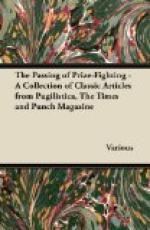He. “YES—I THINK IT MUST BE HIS WIFE.”]
* * * * *
OUR BOOKING-OFFICE.
(By Mr. Punch’s Staff of Learned Clerks.)
War and the Future (CASSELL), by Mr. H.G. WELLS, is not a sustained thesis but just jets of comment and flashes of epigram about the War as he has seen it on the French, Italian and British fronts, and has thought about it in peaceful Essex. A characteristic opening chapter, “The Passing of the Effigy,” suggests that “the Kaiser is perhaps the last of that long series of crowned and cloaked and semi-divine personages which has included Caesar and Alexander and Napoleon the First—and Third. In the light of the new time we see the emperor-god for the guy he is.” Generalissimo JOFFRE, on the other hand, he found to be a decent most capable man, without fuss and flummery, doing a distasteful job of work singularly well. There is some particularly interesting matter about aeroplane work, and the writer betrays a keen distress lest the cavalry notions of the soldiers of the old school should make them put their trust in the horsemen rather than the airmen in the break-through. As for “tanks,” he offers the alternative of organised world control or a new warfare of mammoth landships, to which the devastation of this War will be merely sketchy; but I doubt if he quite makes his point here. And finally this swift-dreaming thinker proclaims a vision which he has seen of a new world-wide interrelated republicanism founded on a recognition of the over-lordship of God.... You put the book down feeling you have had a long, desultory and intimate conversation with a very interesting fellow-traveller.
* * * * *
Really, if Mr. ROBERT HICHENS continues his present spendthrift course, whatever Board controls the consumption of paper will have to put him on half rations. I believe that his literary health would benefit enormously by such a regime. This was my first thought in contemplating the almost six hundred pages of In the Wilderness (METHUEN), and it persists, strengthened now that I have turned the last, of them. Here is a direct and moving tragedy of three lives, much of the appeal of which is lost in a fog of superfluous words. Of its theme I will tell you only this, that it shows the contrasting loves, material and physical, of two widely divergent types of womanhood. Probably human nature, rather than Mr. HICHENS, should be blamed for the fact that the unmoral Cynthia is many times more interesting than the virtuous but slightly fatiguing Rosamund. The former is indeed far the most vital character in the tale, a figure none the less sinister for its clever touch of austerity. Possibly, however, her success is to some extent due to contrast; for certainly both Rosamund and Dion, the husband whom she alienated by her unforgiving nature, embody all the worst characteristics of Mr. HICHEN’S creations.




